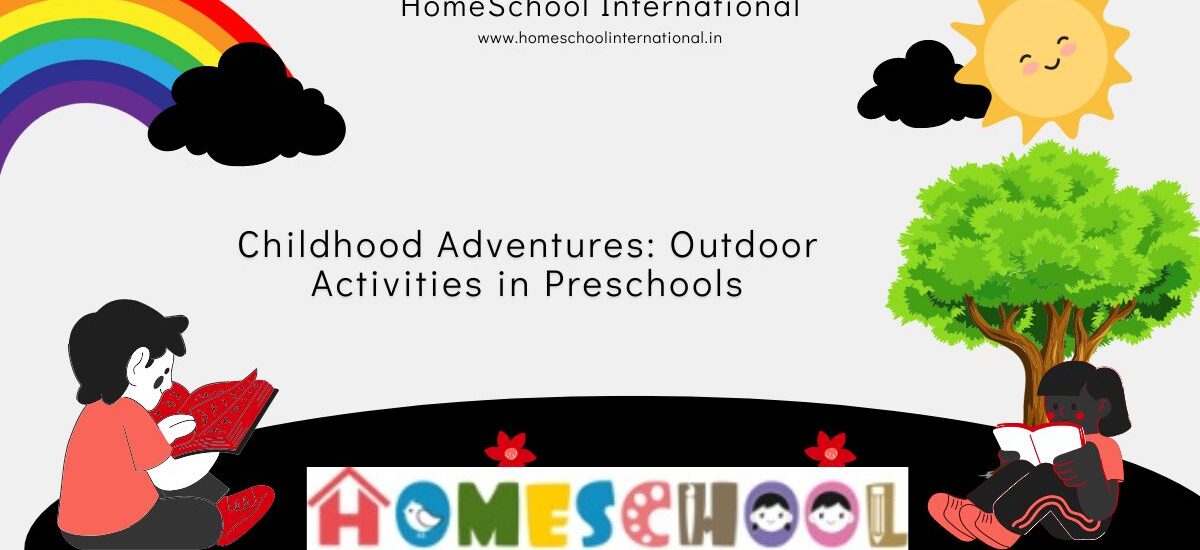Childhood Adventures: Outdoor Activities in Preschools- In today’s fast-paced world, where technology often dominates children’s leisure time, the importance of outdoor activities in preschools cannot be overstated. At Homeschool International, we recognize the immense value of childhood adventures and outdoor exploration in nurturing well-rounded individuals. Join us as we embark on a journey to discover the wonders of outdoor activities in preschools and their profound impact on children’s development and learning experiences.
Also Check: Exploring Montessori: Philosophy and Principles in Early Education
Benefits of Outdoor Activities in Preschools
Outdoor activities play a pivotal role in the holistic development of preschoolers, offering a myriad of benefits that extend beyond physical exercise. Let’s delve into the numerous advantages that outdoor adventures provide for young learners.
1. Physical Development: Outdoor activities provide ample opportunities for preschoolers to engage in active play, promoting physical fitness and motor skill development. From running and climbing to jumping and balancing, outdoor environments offer a diverse range of movements that support gross and fine motor skills.
2. Cognitive Growth: Exploring the natural world stimulates curiosity and encourages inquiry-based learning, fostering cognitive development in preschoolers. Outdoor activities provide rich sensory experiences, allowing children to observe, explore, and make connections with the environment around them. This hands-on approach to learning enhances critical thinking skills, problem-solving abilities, and scientific understanding.
3. Social and Emotional Well-being: Outdoor play encourages collaboration, communication, and cooperation among preschoolers, fostering the development of essential social skills. Through group activities and imaginative play, children learn to negotiate, share, and resolve conflicts, laying the foundation for positive relationships and emotional resilience. Outdoor environments also provide opportunities for risk-taking and self-regulation, empowering children to assess and manage challenges independently.
4. Connection with Nature: Spending time outdoors allows preschoolers to develop a deep connection with the natural world, fostering a sense of wonder, awe, and appreciation for the environment. Through activities such as gardening, nature walks, and exploring natural habitats, children develop a sense of stewardship and environmental consciousness from an early age.
5. Overall Well-being: Engaging in outdoor activities promotes overall well-being by reducing stress, anxiety, and boredom in preschoolers. Fresh air, sunlight, and open spaces offer a rejuvenating environment that supports physical health and mental clarity. Additionally, outdoor play encourages creativity, imagination, and a sense of freedom, leading to enhanced happiness and fulfillment in young children.
Types of Outdoor Activities for Preschoolers
Outdoor activities for preschoolers encompass a wide range of experiences that cater to their diverse interests and developmental needs. Let’s explore some popular types of outdoor adventures that ignite curiosity and promote learning in young learners.
1. Nature Walks and Exploration: Embarking on nature walks allows preschoolers to engage their senses and discover the wonders of the natural world firsthand. From observing plants and animals to collecting leaves and rocks, nature walks provide opportunities for hands-on exploration and scientific inquiry.
2. Sensory Play: Outdoor environments offer rich sensory experiences that stimulate preschoolers’ senses and promote sensory development. From playing in sandboxes and mud kitchens to splashing in puddles and exploring texture-rich materials, sensory play fosters creativity, imagination, and sensory integration.
3. Outdoor Games and Sports: Engaging in outdoor games and sports promotes physical fitness, teamwork, and gross motor skills development in preschoolers. From classic games like tag and hide-and-seek to organized sports like soccer and basketball, outdoor play encourages active participation and healthy competition.
4. Gardening and Planting: Involving preschoolers in gardening activities provides valuable lessons in responsibility, patience, and environmental stewardship. From planting seeds and watering plants to observing growth and harvesting produce, gardening fosters a deeper connection with nature and an appreciation for the food cycle.
5. Creative Arts and Crafts: Outdoor environments serve as inspiring settings for creative expression and artistic exploration. From painting with natural materials and creating nature-inspired crafts to building structures with sticks and stones, outdoor art activities encourage imagination, innovation, and self-expression.
6. Imaginative Play: Outdoor settings offer limitless opportunities for imaginative play and storytelling, allowing preschoolers to transform their surroundings into fantastical worlds and imaginary adventures. From building forts and role-playing to creating outdoor theaters and puppet shows, imaginative play nurtures creativity, social skills, and language development.
Also Check: Monastery Education: A Unique Approach to Child Development
Incorporating Outdoor Activities into Preschool Curriculum
Integrating outdoor activities into the preschool curriculum is essential for maximizing the benefits of outdoor learning experiences. Let’s explore effective strategies for seamlessly incorporating outdoor adventures into the daily routine of preschoolers.
1. Aligning with Learning Objectives: Ensure that outdoor activities align with the learning objectives and developmental goals of the preschool curriculum. Identify specific skills and concepts that can be reinforced through outdoor exploration, such as scientific inquiry, social-emotional development, and physical fitness.
2. Creating a Flexible Schedule: Design a flexible schedule that allows ample time for outdoor play and exploration throughout the day. Incorporate outdoor activities into various parts of the daily routine, including morning circle time, free play sessions, and structured learning experiences. Embrace spontaneity and allow for extended outdoor play when weather permits.
3. Designing Outdoor Learning Spaces: Create inviting outdoor learning spaces that support a wide range of activities and interests. Designate areas for sensory play, nature exploration, gardening, and imaginative play, ensuring that each space is equipped with age-appropriate materials and resources. Foster a sense of ownership and responsibility by involving preschoolers in the design and maintenance of outdoor learning environments.
4. Integrating Cross-Curricular Themes: Integrate outdoor activities seamlessly into cross-curricular themes and units of study. Explore interdisciplinary connections by incorporating nature-themed art projects, science experiments, literacy activities, and math games into outdoor learning experiences. Encourage holistic learning and critical thinking skills through hands-on exploration and inquiry-based learning.
5. Embracing Child-Led Exploration: Empower preschoolers to take the lead in their outdoor learning experiences by embracing child-led exploration and inquiry. Allow children to follow their interests, ask questions, and pursue their curiosity in the outdoor environment. Provide opportunities for open-ended exploration and experimentation, fostering a sense of autonomy and agency in young learners.
6. Collaborating with Parents and Community: Engage parents and the local community in supporting outdoor learning initiatives and activities. Encourage families to participate in outdoor excursions, nature walks, and gardening projects. Collaborate with community organizations, nature centers, and parks to enhance outdoor learning experiences and provide opportunities for hands-on exploration beyond the preschool setting.
Benefits of Nature Connection for Preschoolers
Connecting preschoolers with nature through outdoor activities offers a multitude of benefits that contribute to their overall well-being and development. Let’s explore the profound impact of nature connection on young learners and why it’s essential to prioritize outdoor experiences in early childhood education.
1. Environmental Awareness and Stewardship: Spending time in nature instills a sense of wonder, appreciation, and respect for the environment in preschoolers. Through outdoor activities such as nature walks, gardening, and wildlife observation, children develop a deeper understanding of ecological systems and their role as stewards of the planet.
2. Emotional Regulation and Stress Reduction: Nature has a calming effect on the mind and body, promoting emotional regulation and stress reduction in preschoolers. Immersion in natural settings provides opportunities for relaxation, mindfulness, and sensory exploration, helping children to manage anxiety, improve mood, and enhance overall well-being.
3. Physical Health and Wellness: Outdoor activities promote physical health and wellness by encouraging active play, exercise, and movement in natural environments. From running and climbing to digging and exploring, children engage in physical activity that supports gross motor development, cardiovascular health, and coordination skills.
4. Cognitive Development and Learning: Nature stimulates curiosity, creativity, and cognitive development in preschoolers, fostering a love for learning that extends beyond the classroom. Outdoor environments offer rich sensory experiences, opportunities for inquiry-based learning, and hands-on exploration that enhance critical thinking skills, problem-solving abilities, and scientific understanding.
5. Social Connection and Collaboration: Nature provides a natural setting for social interaction, collaboration, and cooperative play among preschoolers. Outdoor activities encourage communication, teamwork, and negotiation skills as children engage in group games, nature-based projects, and imaginative play scenarios.
6. Sense of Belonging and Connection to Place: Spending time in nature helps preschoolers develop a sense of belonging and connection to their local environment. Through outdoor adventures in parks, forests, and natural habitats, children develop a sense of place, identity, and cultural connection that fosters a deeper appreciation for their surroundings.
Also Check: Daycare Dilemmas: Tips for Selecting the Ideal Childcare
Conclusion: Childhood Adventures- Outdoor Activities in Preschools
As we conclude our exploration of outdoor activities in preschools, it’s evident that nature connection plays a vital role in nurturing the holistic development of young learners. By embracing outdoor adventures and prioritizing nature-based experiences in early childhood education, we empower preschoolers to thrive physically, cognitively, socially, and emotionally.
At Homeschool International, we are committed to championing outdoor learning initiatives and fostering a deep connection with nature among preschoolers. We invite educators, parents, and communities to join us in creating outdoor environments that inspire curiosity, exploration, and wonder in young learners.
Every child deserves the opportunity to explore, discover, and connect with the natural world. Let’s work together to cultivate outdoor environments where childhood adventures are celebrated, and lifelong memories are made. Together, we can empower the next generation of environmental stewards, innovators, and changemakers.











